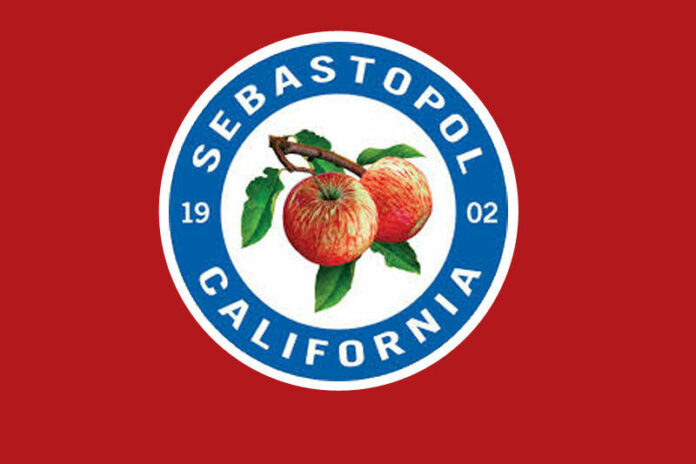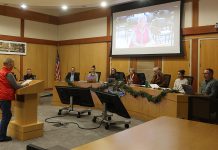At their meetings in January, the Sebastopol city council greenlit some agreements and moved forward with some of their plans.
Sebastopol Inn, now Elderberry Commons, opens
Sebastopol Mayor Una Glass announced at the Jan. 19 city council meeting that the Sebastopol Inn now serving as supportive housing for formerly homeless residents of the county had been renamed Elderberry Commons.
Glass said the Sebastopol area used to have a prominent elderberry path that was significant to the Indigenous people who lived in the area “before there were white people here.”
Glass said she and Councilmember Patrick Slayter had attended numerous meetings regarding the program as the members of the city council’s housing subcommittee.
According to Slayter, things seem to be going smoothly at Elderberry Commons, where Glass said around 14 or 15 people had moved in by that time. Slayter said Sebastopol’s interim police chief reported no calls attributed to the property as of Jan. 14.
They met with staff from the Sonoma County Community Development Commission (CDC), West County Community Services (WCCS) and the owner of the program’s interim medical provider, Disaster Emergency Medical Assistance (DEMA), regarding various concerns raised in council meetings leading up to its opening, she said.
Slayter said they met with some of the same county representatives and business and property owners in the area, but that it was not well-attended by business owners.
West County TOT endorsement
At the Jan. 19 Sebastopol City Council meeting, councilmembers unanimously voted to authorize Mayor Una Glass to draft a letter in support of Measure B, the West County Transient Occupancy Tax proposal.
The measure heads to a special election on March 2 and would add another 4% lodging tax for guests of west county hotels and vacation rentals to fund emergency medical and rescue services and education in west county, according to a presentation that night by 5th District Supervisor Lynda Hopkins, now chair of the Board of Supervisors.
While the transient occupancy tax would only apply to guests in unincorporated west county and not Sebastopol lodgings, the city’s voters get to weigh in, Hopkins said. According to the Sonoma County Registrar of Voters Office, the special election will occur in the unincorporated Sonoma County region that includes the West Sonoma County Union High School District and the Bodega Bay Fire Protection District.
The text of Measure B says its passage is expected to bring in $2.7 million annually. The county counsel’s impartial analysis on the local ballot measure said the measure tops off the existing county-wide 12% general transient occupancy tax “applicable to the entire unincorporated area in the County of Sonoma for such lodgings,” which results in a 16% lodging tax altogether in west county.
Water Upgrades $ave master agreement
Sebastopol recently became the first Bay Area city to sign up for the Water Upgrades $ave program through Bay Area Regional Energy Network (BayREN), according to a Jan. 21 press release from BayREN’s overhead organization, the Association of Bay Area Governments (ABAG).
Enrolled water customers can retrofit water efficiency projects through the voluntary financing service’s monthly charge on their water bill, set lower than the upgrade’s estimated savings, Program Manager Chris Cone said at the Jan. 19 Sebastopol city council meeting.
“So this means the customer will begin saving right away and yet they use a portion of their savings over time, through this monthly charge, to pay off the cost of the project,” she said. “And this puts each customer in a cash-positive position, with no out-of-pocket, in order to participate in the program.”
The city council authorized city manager Larry McLaughlin on Jan. 19 to sign the master agreement for the Water Upgrades $ave service and adopt a resolution to set up its fee schedule.
Cone said water conservation upgrades qualify for the no-upfront cost service so long as the on-bill charge will cover 80% of the total projected savings. High-efficiency showerheads and toilets count as such projects, which can be either outdoor or indoor, according to the Jan. 21 press release.
The press release said the program aims to be accessible to low and middle-income residents and renters and adapt to drought conditions. “California recently switched from an emergency response to drought conditions to an ongoing (one). They call it, ‘making conservation a California way of life,’” Cone said. “This is a new policy initiative from the state, and a new target for indoor and outdoor water conservation is a part of this policy package.”
Vice Mayor Sarah Glade Gurney said a past meeting to review the program roughly a year ago yielded the approach that Sebastopol is home to many old houses to be renovated, “and if we can encourage our citizens to be better at water conservation through a program that’s going to make that more financially available to them, we want to do it.”
Cone said the master agreement includes a request that the partner utility — the City of Sebastopol, according to the preamble in Jan. 19 agenda item’s report — develop a list of local service contractors with a Sebastopol business license.
A program operator hires program contractors with qualifying cost and service standards from a list compiled with candidates put forward by the partner utility, the California State Licensing Board and professional associations, “like an association of plumbers,” she said.
The screening process includes efforts “to ensure that Sebastopol contractors would be first on the list to be notified and be given full access to the application process to become a program contractor,” she said.
The Regional Climate Protection Authority (RCPA) website explains that BayREN, RCPA and the partner utility will be in charge of getting customers signed up.
She said the Water Upgrades $ave program involves three fees: a fee that is 2% of the project costs to pay for the utility to take part in the program, another 2% capital fee to deliver funding coming from ABAG and the Metropolitan Transportation Commission (MTC) and a 1% administration fee “to just cover the cost of moving the money from ABAG into the program to pay for projects that then are paid back through the on-bill charge by participating customers.”
The program manager said this regional program resolves some obstacles that faced its pilot models in Windsor in 2012, Hayward in 2014 and East Bay Municipal Utility District in 2016, like identifying an alternative funding source than the city budget.
“The regional program is put together to allow utilities to participate without a big commitment of staff time or funding from the budget, and yet to provide to their citizens this voluntary program that allows them to install measures without an out of pocket cost,” Cone said.
Annual audit
Also, at the Jan. 19 meeting, the Sebastopol City Council also received a presentation of its annual audit for the year that ended June 2020 by Mitesh Desai, certified public accountant and principal at Badawi & Associates. The council members unanimously approved receipt of Desai’s presentation and the acceptance of the report with a slide to be corrected and delivered to the city.









